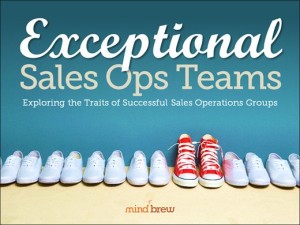If you’re looking at a task from the outside, it often seems easier than it really is — especially if you’ve seen other people completing it successfully. At some point in your life, you might have thought, “How hard can it be to get a toddler to go to bed?” Or maybe, “How hard can it be to back the RV into the parking spot?” Or even, “How hard can it be to lose ten pounds?”
And of course, if you’ve ever actually tried to do any of these things, you know that the answer is, “A lot harder than it looks.”
Something similar often happens to sales ops teams. Because very few people actually have experience doing sales ops, other people in the company might not appreciate how difficult effective sales ops actually is. They might think that sales ops is just looking at some numbers and creating reports once a month. I mean it’s basically a glorified secretarial position, right?
Unfortunately, this attitude is especially common among sales teams. A healthy amount of confidence is necessary to be good at sales, but sometimes this self-confidence leads salespeople to underestimate the contributions of others. They see themselves as the heroes. The big shots. The people the company couldn’t do without. After all, they are the ones actually going out and getting the business that earns the money that pays for everyone else’s salaries.
Most people probably don’t say these things out loud where you can hear them. But at least one person in your organization is almost certainly thinking it. And some people might be whispering it when you’re not in earshot.
So what can you do about it?
In talking with very successful B2B sales teams, we’ve learned that they tend to do three important things that bolster their reputation within the company:
- Thinking strategically. These teams aren’t content with just administering sales processes — they adopt a more strategic perspective, get serious about data analysis, and leverage the insights they glean to influence the broader sales process.
- Driving change. When they’ve gained those insights, top sales ops teams use change management principles to push the company in a new direction. They focus on understanding organizational dynamics and tap that knowledge to promote initiatives that will be good for the company. Organizations rarely change by themselves. They need to be proactively driven.
- Evangelizing. You can’t be shy and be effective in sales ops. Top sales teams constantly highlight their initiatives and results (and take credit where they can). They let everyone else know what they are doing and provide enough detail that other people understand some of the difficulty involved.
If you need some help overcoming negative attitudes about sales ops in your company, we have four resources that can help:
- Exceptional Sales Ops Teams
- How to Boost the Perceived Value of Sales Operations
- Making Change Happen
- From Tactical to Strategic Sales Ops
All four are full of practical tips that you can use to show people how sales ops benefits the organization. The good news is that as you put this advice into practice and your influence increases, it becomes much easier to convince everyone else to support your proposals.
And now if you’ll excuse me, I need to install a new dishwasher. How hard can it be?














